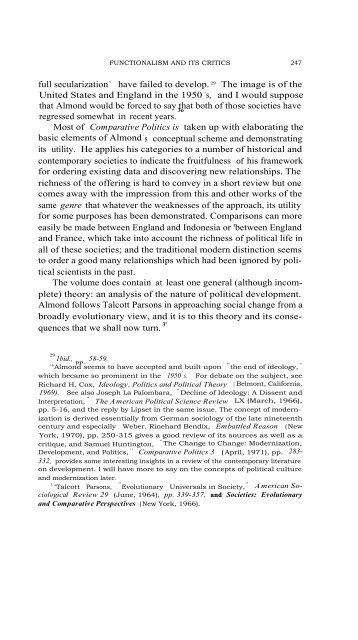FUNCTIONALISM AND ITS CRITICS - Intercollegiate Studies Institute
FUNCTIONALISM AND ITS CRITICS - Intercollegiate Studies Institute
FUNCTIONALISM AND ITS CRITICS - Intercollegiate Studies Institute
You also want an ePaper? Increase the reach of your titles
YUMPU automatically turns print PDFs into web optimized ePapers that Google loves.
<strong>FUNCTIONALISM</strong> <strong>AND</strong> <strong>ITS</strong> <strong>CRITICS</strong> 247<br />
full secularization " have failed to develop. 29 The image is of the<br />
United States and England in the 1950 ' s, and I would suppose<br />
that Almond would be forced to say that both of those societies have<br />
regressed somewhat in recent years. 3o<br />
Most of Comparative Politics is taken up with elaborating the<br />
basic elements of Almond ' s conceptual scheme and demonstrating<br />
its utility. He applies his categories to a number of historical and<br />
contemporary societies to indicate the fruitfulness of his framework<br />
for ordering existing data and discovering new relationships. The<br />
richness of the offering is hard to convey in a short review but one<br />
comes away with the impression from this and other works of the<br />
same genre that whatever the weaknesses of the approach, its utility<br />
for some purposes has been demonstrated. Comparisons can more<br />
easily be made between England and Indonesia or 'between England<br />
and France, which take into account the richness of political life in<br />
all of these societies; and the traditional modern distinction seems<br />
to order a good many relationships which had been ignored by political<br />
scientists in the past.<br />
The volume does contain at least one general (although incomplete)<br />
theory: an analysis of the nature of political development.<br />
Almond follows Talcott Parsons in approaching social change from a<br />
broadly evolutionary view, and it is to this theory and its consequences<br />
that we shall now turn. 3'<br />
29<br />
1bid., 58-59. pp.<br />
'°Almond seems to have accepted and built upon " the end of ideology, "<br />
which became so prominent in the 1950 ' s. For debate on the subject, see<br />
Richard H. Cox, Ideology, Politics and Political Theory ( Belmont, California,<br />
1969). See also Joseph La Palombara, " Decline of Ideology: A Dissent and<br />
Interpretation, " The American Political Science Review LX (March, 1966),<br />
pp. 5-16, and the reply by Lipset in the same issue. The concept of modernization<br />
is derived essentially from German sociology of the late nineteenth<br />
century and especially Weber. Rinehard Bendix, Embattled Reason (New<br />
York, 1970), pp. 250-315 gives a good review of its sources as well as a<br />
critique, and Samuel Huntington,<br />
" The Change to Change: Modernization,<br />
Development, and Politics, " Comparative Politics 3 (April, 1971), pp. 283-<br />
332, provides some interesting insights in a review of the contemporary literature<br />
on development. I will have more to say on the concepts of political culture<br />
and modernization later.<br />
3 "Talcott Parsons, " Evolutionary Universals in Society, " American Sociological<br />
Review 29 (June, 1964), pp. 339-357, and Societies: Evolutionary<br />
and Comparative Perspectives ( New York, 1966).
















